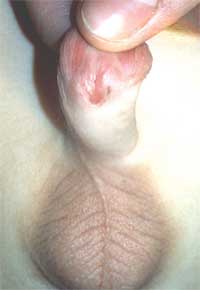 UNITED KINGDOM - Each year more than 1,200 boys in the UK are born with a genital abnormality. Experts say the number has doubled over the past 25 years, and that ‘gender-bending’ chemicals are to blame.
UNITED KINGDOM - Each year more than 1,200 boys in the UK are born with a genital abnormality. Experts say the number has doubled over the past 25 years, and that ‘gender-bending’ chemicals are to blame.Correcting such abnormalities can be a traumatic experience for both child and parent. Here a mother whose sons were affected describes their experience.
Sue Phipps gave birth to twin boys after a six-hour labour and she was thrilled when the two dark-haired bundles were placed in her arms. But euphoria quickly turned to confusion when she was told that both boys had been born with malformed penises.
‘I just couldn’t understand it. I’d had a straightforward pregnancy and nothing had ever shown up on any of my scans to suggest there was a problem,’ says Sue, 43.
Yet what the scans were not able to show was that her sons had hypospadias. This is a condition where the opening of the urethra — the tube that carries urine and semen out of the body — is on the underside of the penis instead of at the end.
In some cases the penis curves downwards, with the foreskin covering only the front. In severe forms of hypospadias the urethral opening is so far back it is almost in the scrotum.
‘As I held my newborn children I could see that the hole through which the boys would pass urine was not at the tip of the penis but halfway down, further underneath,’ says Sue.
‘I realised it didn’t look right, but I was so glad that my babies had been born without any life-threatening complications that my main feeling was relief.
‘It was my husband who was really shocked by the boys’ condition. As a father, he couldn’t believe this vital part of their manhood was somehow malformed.’
Mr and Mrs Phipps were told that while the immediate physical problem could be corrected with surgery, the condition was also linked to low sperm count and a higher risk of developing testicular cancer.
Hypospadias can be triggered by a random genetic fault — and initially the doctors suggested this as the cause of their sons’ problem. However the Phipps have no family history of the condition, and they — and their specialist — are convinced environmental factors are to blame.
There is increasing evidence to show that male reproductive abnor-malities such as this are linked to exposure to ‘gender-bending’ chemicals found in everyday products such as shampoo and carpets.
These chemicals are known as hormone disruptors or EDCs — endocrine disrupting chemicals. They include phthalates, a group of chemical liquids which are used to give many ordinary products a flexible texture.
Phthalates are found in plastic, carpets, fabric, make-up, perfume, cosmetics, milk, vegetables and pesticides.
In a two-year experiment by the Medical Research Council’s Human and Reproductive Sciences Unit in Edinburgh, rats exposed to high levels of phthalates had double the rate of genital defects and low sperm counts.
More crucially, in the first human study, researchers from the University of Rochester in New York have now linked exposure to phthalates to a higher risk of genital abnormalities in baby boys.
The researchers, who examined 134 boys, found women with higher levels of phthalate-related chemicals in their blood were more likely to give birth to babies with undescended, or small testicles and small penises.
Professor Richard Sharpe of the MRC’s Human Reproductive Sciences Unit believes that all these male reproductive abnormalities are inter-related and that the increase is linked to environmental and lifestyle factors.
‘The problem is that we don’t know the exact cause. But the fact is that phthalates are the most ubiquitous of environmental chemicals. They contaminate house dust, even rain water. There is no definitive proof yet that they are linked to male birth abnormalities. But they are a strong candidate.’
Aivar Bracka, a consultant genito-urethral surgeon who specialises in hypospadias, is convinced that environmental factors are to blame.
‘All the solid evidence points to a strong link between the rise of male reproductive abnormalities and something in our environment.’
Hereditary factors can only partly explain hypospadias, he says. ‘For example I have seen twins where one has the condition and one hasn’t even though the children are genetically identical.
'That situation can only arise from an external factor affecting foetal development. Otherwise both twins would be affected.’
The theory is that phthalates interfere with the manufacture of the male sex hormone, testosterone at a critical stage in foetal development — the first three or four months of pregnancy. It is testosterone which gives a foetus its male characteristics.
There is no doubt that women in particular are vulnerable to chemical exposure. According to Julia Mitchell, spokeswoman for environmental website www.chemicalsafeskincare.co.uk, the average woman will use 12 different cosmetic products a day — unwittingly applying 175 different chemicals to her body.
And in recent tests carried out by WWF, formerly the World Wide Fund for Nature, man-made pollutants and chemicals were found in every one of 27 food products tested, including bread and eggs.
The amount of contaminants was well within legal limits, but the worry is that the chemicals may represent a serious risk when they mix together in the body.
At the moment it seems that only baby boys are at risk of reproductive abnormalities. (Indeed Sue Phipps and her husband Peter, 52, a retired businessman, have a 14-year-old daughter, Harriet, who has not suffered any problems.)
However, as Professor Sharpe explains, ‘just because the studies have not yet been carried out doesn’t mean that females are not also vulnerable’.
Changes in women would be more subtle, and not visible. ‘However there is potential for any organ of the body to be affected by exposure to chemicals.’
Sue, who gave birth to the twins at Warwick Hospital in April 1995, was told that her sons’ condition was ‘mild to moderate’.
And while there was no rush for surgery, it was clear the condition could not be left untreated: the children would have been unable to pass water standing up, since the urine would have been impossible to direct.
‘We also knew they could face psychological problems of having a penis that looked different. And, though it seemed ridiculous to think of it when they were so young, hypospadias could also compromise their ability to have intercourse.
'It seemed right to correct the problem while none of these things were an issue.’
In every other way the children were normal healthy boys. They were referred to a consultant plastic surgeon at their local hospital who assessed the boys every year until they were four.
The operation was finally scheduled for July 2000 — by then they were considered old enough to cope with surgery and the timing meant they could start school in September without appearing ‘different’.

The surgery involved extending the existing urethra. This was done by creating an artificial urethra using a tube of skin taken from the foreskin and then stitching it to the end of the existing urethra.
Grafting on this new piece of urethra would close the existing hole and the plastic surgeon then guided the artificial urethra to the end of the penis.
‘It’s awful watching not one, but two, of your children going down to surgery,’ says Sue.
‘Henry went first for the 90-minute operation. And as he came back from theatre, Charlie, who was already sedated, was wheeled down.’
In order to allow the stitches to heal, urine was not initially allowed to pass down the new urethra. Instead the boys were fitted with a stent which diverted urine from the bladder into a catheter bag.
However shortly after the boys were brought back from theatre it was clear something was wrong. Within 20 minutes they were both writhing in agony.
‘It was terrifying to watch,’ says Sue. The problems seemed to be caused by a blockage in the stent. During the children’s week-long stay in hospital, doctors had to reposition the catheter four times as on each occasion their pain only intensified.
The boys were not allowed to leave hospital until they could pass water without the catheter. But when they tried urinating naturally their parents were shocked by what she saw.
‘When Charlie tried, the urine came out of five tiny holes near the end of his penis. When Henry did the same it came out of three holes. It sounds crude but it was like looking at a hosepipe with tiny puncture marks in it.
‘Though we were assured these would heal naturally we were horrified. Their penises looked grotesque too. From thinking that this was just a routine operation I wondered if they would ever function normally.’
Hypospadias is technically difficult to correct and the Phipps sought a second opinion. They consulted Aivar Bracka, a consultant genito-urethral surgeon who specialises in hypospadias, at Wordsley Hospital in Stowbridge.
He suggested a six-week wait to allow the children to recover from their trauma before carrying out corrective surgery — one-third of his caseload comprises similar repair work.
The ‘salvage’ operation took an hour. ‘This time, thankfully, there were no tears or pain,’ says Sue. ‘Within a week their catheters were taken out and the boys healed quickly and were back at school within three weeks.
'The boys now have a check-up every two years and will do so until the age of 18.’
Although the boys have put the surgery behind them, Sue cannot but be concerned about what might lie ahead. Studies have shown that boys with the condition tend to have a slightly lower sperm count which could lead to problems conceiving. There is also an increased risk of testicular cancer.
‘They haven’t been offered any fertility tests and to be honest don’t intend to pursue this unless it becomes an issue,’ says Sue. ‘Of course it is at the back of my mind, but I don’t dwell on it.’
So what can be done to protect future children from such abnormalities. Later this month the EU parliament will vote on replacing hazardous chemicals in everyday products with safer alternatives.
In the meantime, Prof Sharpe suggests that pregnant women try to minimise chemical exposure where they can. ‘One new study has shown how rapidly the skin absorbs phthalates because it has such a large surface area. So it is best for pregnant women to try to avoid applying body creams and cosmetics.’
For Sue the message is clear. ‘I would urge all women who are thinking of having babies to be aware of the chemicals in everyday life. We need to raise awareness about the potential dangers.’
from The Daily Mail
http://www.stourbridgenews.co.uk/mostpopular.var.1601465.mostviewed.top_doc_on_indecent_assault_charges.php
ReplyDeletehttp://www.halesowennews.co.uk/news/hnnewsroundup/display.var.1604053.0.surgeon_on_child_assault_charges.php
ReplyDeletehttp://gmc-uk.org/concerns/hearings_and_decisions/iop/2007_07_02.asp
ReplyDelete